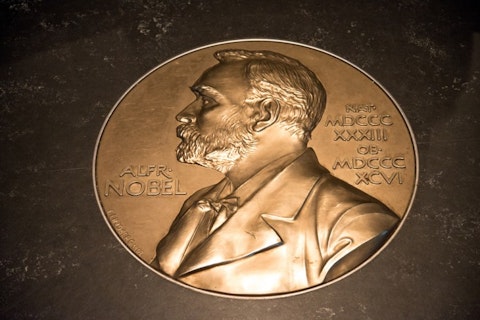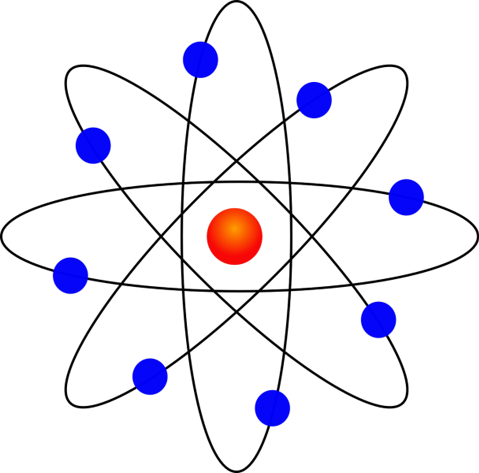Have you ever wondered who were the youngest Nobel Prize winners? We normally assume a winner of one of the prestigious Nobel Prizes to be mature in their years, having acquired the necessary wisdom through experience – which usually equates to time. However, our list of the 6 Youngest Nobel Prize Winners demonstrates that there are exceptions to this commonly held belief, as you will see. Interestingly, the average age of all the Nobel Prize Winners is 59. This figure takes into account all prize categories, and looks at data since the prizes began in 1901. The modal age bracket for winners is the relatively veteran 60-64 years. However, as with most things there are exceptions, and an examination of winners across all the Nobel Prize Categories reveals some winners are awarded their prize well before retirement age.

Pe3k / Shutterstock.com
The Nobel Prize was created by Alfred Nobel, a Swedish chemist and engineer, born in 1833. As of 1901, prizes were awarded in six categories: physics, chemistry, medicine, literature, peace and economy. It is interesting to examine each prize category separately: there are noticeable trends when we study the different prize categories. At 67, the winners of the Nobel Prize for Economy have a higher average age than any of the other five categories. At the other end of the spectrum, the prize category with the winner with the youngest average age is the physics prize – winners are only 55 on average.
Interestingly, not everyone who wins will accept their prize – have a look at our articles on 6 Nobel Prize Winners Who Declined the Prize to find out why. The young success stories in this feature all accepted their award so without further ado, we bring you the 6 Youngest Nobel Prize Winners!
6. Paul Dirac
Age: 31
Date of Birth: August 8th, 1902
Award: Nobel Prize in Physics, 1933
Beginning our list, it’s the eminent physicist Paul Dirac, who was born in Bristol, UK. Dirac, a contemporary of Albert Einstein, was just 31 when he won the Nobel Prize in Physics for ‘the discovery of new productive forms of atomic theory’. During his long and successful career, he also won the Royal Medal, the Max Planck Medal and the Copley Medal. Known for his precise and sometimes unpredictable nature, his colleagues at Cambridge University regularly joked about his slow conversational speed, remarking that he sometimes took a good hour to complete a sentence. Nevertheless, his peer Albert Einstein admired his work greatly, although he also acknowledged his difficulties, famously commenting that ‘this balancing on the dizzying path between genius and madness is awful.’ He is pictured below (in the very centre) with Einstein, at a Physics Conference in 1927.

5. Carl David Anderson
Age: 31
Date of Birth: 3 September, 1905
Award: Nobel Prize in Physics, 1936
Carl David Anderson won the Nobel Prize in Physics for his discovery of the positron, the first established ‘antiparticle’. He was born in New York, of Swedish parents, and as a child had his sights set on a career in athletics, specifically as a high jumper. Fortunately for the world of particle physics, he changed his mind and went on to study physics and engineering at the California Institute of Technology. Following his early Nobel Prize achievement, Anderson went on to win many other awards, later becoming a member of the National Academy of Science. Anderson died on January 11th, 1991.
4.Tsung-Dao Lee
Age: 31
Date of Birth: November 24th, 1926
Award: Nobel Prize in Physics, 1927
Like Anderson, Shanghai-born Tsung-Dao Lee was also awarded the Physics prize for his work in the field of particle physics. He made important discoveries about how matter and anti-matter relate to each other. Before his award, and aged just 20, Lee was chosen by the University of Chicago to study at their grad school despite not actually having an undergraduate degree of any kind. He went on to become Professor of Physics at Columbia University and continued his research in the field of elementary particle physics.

3.Werner Heisenberg
Age: 31
Date of Birth: December 5th, 1901
Award: Nobel Prize in Physics, 1932
Our fourth young physicist in the list of 6 Youngest Nobel Prize Winners, Heisenberg studied physics at the University of Munich and, following his PhD, became Max Born’s assistant at the University of Göttingen. He had a number of other successful research positions at universities across Europe. However, it was the end of the Second World War which saw his path change fate, being taken prisoner by the American military intelligence team as he cycled to his family’s holiday home in Bavaria. He was held captive in England until January 1946, when he returned to the Max Planck Institute in Germany. He won the Nobel Prize for his discoveries in the field of quantum mechanics. He had seven children and died in 1976.

2. William Lawrence Bragg
Age: 25
Date of Birth: March 31st, 1890
Award: Nobel Prize in Physics, 1915
William Lawrence Bragg was, until last year, the youngest ever Nobel Prize Winner, winning it jointly with his father (William Henry Bragg), at the age of just 25. The award came for ‘services in the analysis of crystal structure by means of X-ray’ and you may have heard of ‘Bragg’s law’ – a scientific explanation of x-ray diffraction. Bragg was originally born in Adelaide, Australia but spent most of his life in Britain. He went on to work at the University of Cambridge, and was Cavendish Professor at the time of important discoveries concerning the nature of DNA. Bragg died in 1971, at the age of 81.
1.Malala Yousafzai
Age: 17
Date of Birth: July 12th, 1997
Award: Nobel Peace Prize
Completing our list of the 6 Youngest Nobel Prize Winners, it’s the inspirational Malala Yousafzai. Malala was born in north-west Pakistan in 1997. At the age of 11, she began to write a blog under a pseudonym for the BBC Urdu service. She spoke about her fears that the school she loved attending may be attacked, having witnessed a rise in military activity in her district. The blog rose in popularity, and Malala was revealed as its author. Shortly after, her family began to receive death threats and on October 9th, 2012 a masked gunman from the Taliban boarded her school bus and shot her in the head and neck. She was close to death and Malala remained in a critical condition. She was flown to the Queen Elizabeth Hospital in Birmingham, UK, for specialist treatment. Her family travelled to the UK and Malala was eventually discharged in January, 2013. She now lives in Birmingham where she works to promote the right of all children to an education.

JStone / Shutterstock.com





